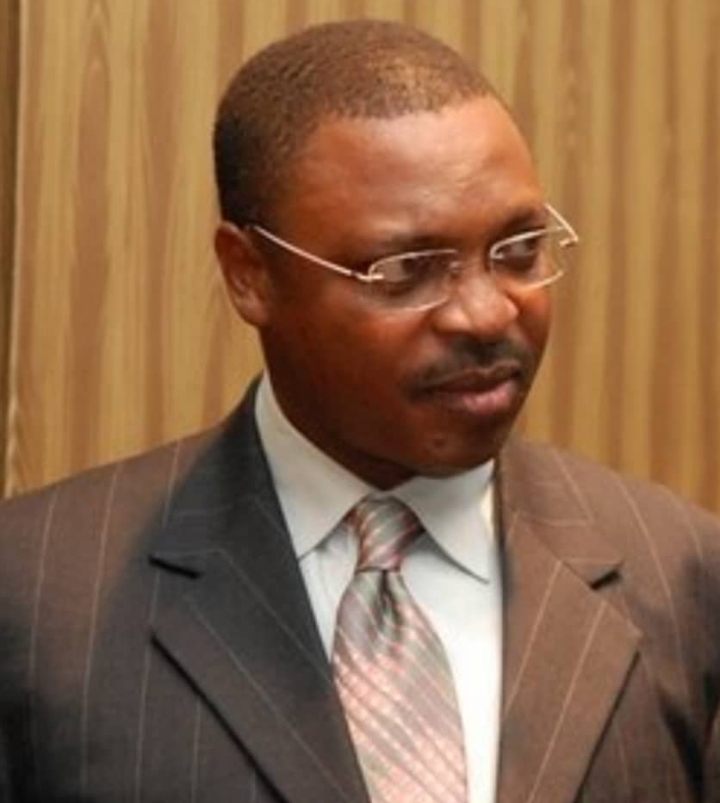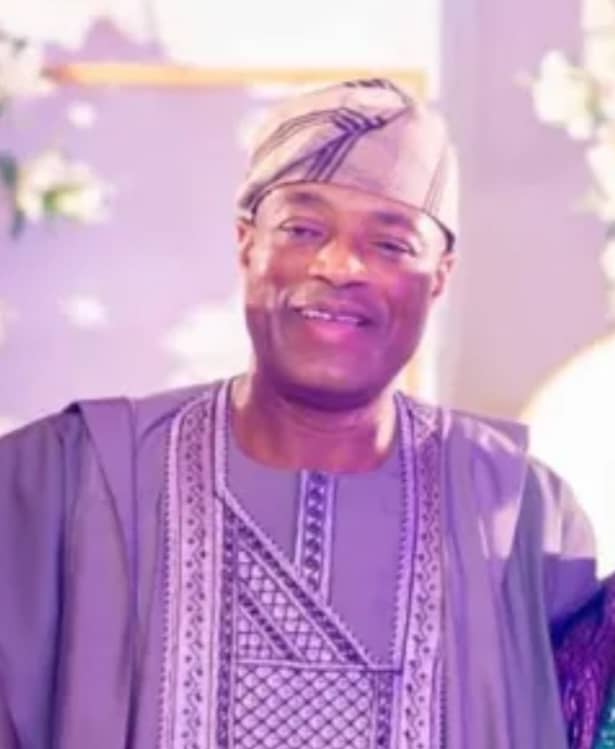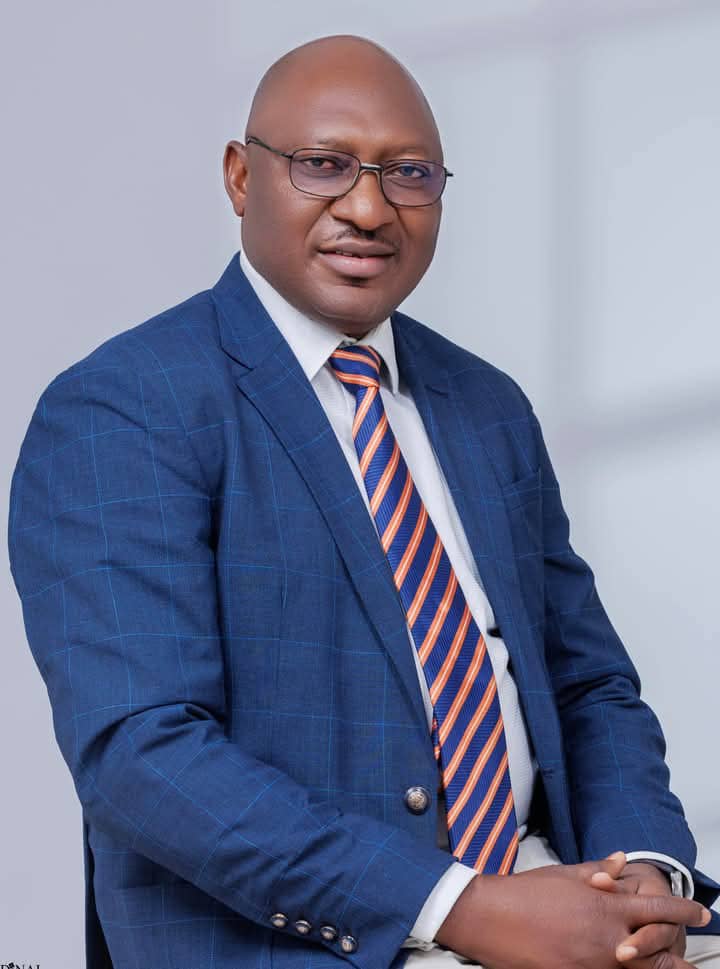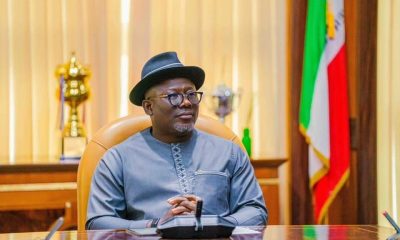Opinion
*MOURNING JEMITOLA, REMEMBERING GIWA-AMU*

*By Tunde Olusunle*
It was a relay of calls competing for access to me Thursday February 6, 2025. Messages tagged “Breaking News” were equally discernible as they streamed onto my WhatsApp page. I would subsequently get to know that Christopher Adewole Jemitola, erstwhile aide-de-camp, (ADC) to former President Olusegun Obasanjo, had sadly and unexpectedly passed, just minutes ago. Those who know that I served as an aide to Obasanjo during his two terms in office, from 1999 to 2007, knew I would have known Jemitola. Our offices were in the very same one-storey building housing the seat and office of the President. The ADC and senior non-uniformed security aides to the Commander-in-Chief were on the ground floor. Those of us who manned the “Secretariat of the President,” the very next door to the nation’s helmsman, were upstairs. We often began our days together from the President’s residence, chaperoning him with his other aides, through the walkway linking his home and office, and vice versa. We were components of what is described as the “main body” of the President’s aides. We attended official events with him and flew on the presidential jet with him as well.
Jemitola was preceded on the job by Solomon Uangbaoje Giwa-Amu, who was Obasanjo’s ADC from 1999 to 2003. Giwa-Amu pulled me aside on the sidelines of the 2002 edition of the United Nations General Assembly, (UNGA), in New York. The bespectacled Giwa-Amu, famous for the red beret of the “military police,” the corps to which he belonged in the army was then a full Colonel. He recounted it had been worthwhile working with Obasanjo, meeting a broad spectrum of people and gaining invaluable experience the barracks would never have availed him. He said the President wants to continue with him into his second term because of the “father-son” relationship they had developed. Giwa-Amu, however, said he was personally minded about his mainstream career as a soldier. He said he desired to speedily return for reintegration into the military system, to mitigate envy and misgivings by his colleagues.

I functioned as master of ceremony for quite a number of state events, including dinners and receptions the President hosted for his visiting foreign colleagues. Obasanjo added that to my schedule beginning from a reception he hosted in honour of the former Gambian President, Yahya Jammeh. Renowned for his thriftiness, Obasanjo believed that professional comperes charged too much for their services. He believed many of them were not as articulate as I am, and more importantly, he wouldn’t have to pay for my services. Giwa-Amu loved my cadenced delivery and measured wit. He looked out frantically for me the day he was decorated Colonel in the chambers of the Federal Executive Council, (FEC). I was, unfortunately, otherwise engaged, especially because I had workstations both in the State House and the Federal Secretariat.
Tall, fair-complexioned, unobtrusive, Christopher Jemitola was a permanent fixture behind Obasanjo during his second term as President. He was professional, courteous and humble, the archetypal “officer and gentleman.” Whenever our paths crossed, communicated majorly in Yoruba which he spoke flawlessly. This was despite the fact that he wasn’t from a core Yoruba-speaking state. Not knowing who was older between both of us, he related with me with the kind of deference which presupposed I was the older party. I went to his residence abutting the President’s one morning and told his batman to inform him I wanted to see him. The batman returned to inform me that Jemitola said everyone desirous of a meeting with him should come over to his office. I stood my ground and gave my call card to the soldier to give to his boss. Jemitola emerged from the bathroom and was still mopping his body with his towel, apologised and listened to me. The information was beneficial to him and he was most thankful.
Those of us who served in the Obasanjo government went our separate ways after May 29, 2007. Jemitola returned to the Nigerian Army and was deployed to the Nigerian Embassy in Brazil as Defence Adviser. Giwa-Amu before him had served in a similar capacity at the Nigerian Embassy in Washington DC, between 2003 and 2007. Within that period, Giwa-Amu attended the US War College. Upon Jemitola’s return from Brazil, he was deployed to the position of Director of Defence Information, (DDI), at the Defence Headquarters, (DHQ). We thereafter saw each other fairly frequently on Sundays because we worshipped at the same parish of the Redeemed Christian Church of God, (RCCG) in Abuja. He was always his usual self, with zero affectations, no fawning aides holding his Bible for him, generous with his handshake, just himself.
Jemitola was promoted to the rank of Major General in 2014. Following the appointment of Tukur Buratai as Chief of Army Staff by the immediate past President, Muhammadu Buhari, in 2015, Jemitola was deployed as Commander, Corps of Signals, Headquarters, Lagos. Not too long after, he was reassigned as the Chief of Policy and Plans, (COPP), of the Nigerian Army. Such was the career mobility of Jemitola during his years in active military service. Following his retirement from service a few years ago, Jemitola made forays into post-regimental life, serving as Senior Advisor for Military Communications at Pinnacle Communications Ltd, in 2019. The outfit, a digital switchover licensee is headquartered in Asokoro, Abuja. The Independent Corrupt Practices and Related Offences Commission, (ICPC), invaded the offices of the organisation January 22, 2020, weeks before the Chairman of the company, Lucky Omoluwa passed, February 18, 2020.
Major General Christopher Jemitola and his predecessor, Brigadier General Solomon Giwa-Amu, coincidentally, both hailed from Edo North in Edo State. That Obasanjo happily worked with both of them without parochial consideration of their origins reinforced the pan-Nigerian globality of the former President who eternally placed substance and quality, above primordial concerns like ethnicity and creed. Jemitola was from Ososo in Edo State, while Giwa-Amu was from Sabongida-Ora. As though the ability to play the game of squash was a prerequisite for being ADC to Obasanjo, both gentlemen played the game well. Indeed, they typically began their days, sparring with Obasanjo in the squash court annexed to the presidential residence. By tragic coincidence, Jemitola and Giwa-Amu both died in the month of February. Giwa-Amu died on Monday February 18, 2008, in an automobile accident between Abuja and Kaduna, following a tire burst to the vehicle in which he was riding.
He was to deliver a lecture at the Armed Forces Command and Staff College, (AFCSC), in Jaji, Kaduna State and reportedly opted to ride in the Toyota Coaster bus conveying other officers and men to the lecture, while his staff car, drove behind. Of all the 18 occupants of the said bus, Giwa-Amu was the singular casualty. Gabriel Giwa-Amu, an attorney and brother to Solomon Giwa-Amu, sustained inquisition into this riddle for several years. Yes, there was a deep cut in Solomon Giwa-Amu’s head, according to family members, but there was no physical wound of any kind on his body.
There were suspicions that Giwa-Amu’s ever rising profile, troubled not a few interests in the army. Recall his fears about possible peer jealousies to which I earlier alluded. He was just 49 when he passed. He would have been 66 this year and would have been long retired from active service. I attended his final rites of passage and interment in his private residence, in Sabongida-Ora. He had four children with his beloved wife, Judith. Jemitola turned 63 on Christmas day last December 25. Like many retirees, golfing appealed to him. He could play the game anytime of the day, keep fit and stay in the company of friends. He slumped and passed at the IBB Golf Club, Abuja the morning of Thursday February 6, 2025, after playing the game. He had two children, Caleb and Iman, with Josephine, his erstwhile wife.
So sad Nigeria has lost the sheer quality, the multidimensional reservoir of institutional memory embedded in the persons of Major General Christopher Adewole Jemitola and Brigadier General Solomon Uangaboje Giwa-Amu. Their wisdoms would, without doubt, have served Nigeria positively, especially in the security and military ecosystem to which they devoted decades of their shortlived lives. People like them should be resource persons in the many academies, centres, colleges and institutes of the Nigerian military. They should today be Emeritus instructors in: Civilian/military relations; Sustenance of military professionalism in a democratic dispensation; Ensuring inter-service collaboration between sister security departments in a democracy, and so on. We pray God to grant sweet repose to their souls, even as we entrust their families to the eternal care of God the Almighty.
*Tunde Olusunle, PhD, Fellow of the Association of Nigerian Authors, (FANA), is an Adjunct Professor in the Centre for Creative Writing, University of Abuja*
Opinion
CBN leads financial dialogue with JP Morgan, NGX, others, in pre-spring meetings Forum

By Dr. Ibrahim Modibbo
In anticipation of the International Monetary Fund (IMF) and World Bank Group (WBG) Spring meetings which commenced on Monday, April 21, 2025, the Central Bank of Nigeria (CBN) partnered with J.P. Morgan, the Nigerian Exchange Group (NGX) and Africa Private Capital Association (AVCA) to host a high-profile global forum at Nasdaq MarketSite in New York on Thursday, April 17, 2025, according to press statement by Dr Ibrahim Moddibo.
The forum, titled “The Nigeria Investment Agenda: Pathways for Growth & Global Partnerships,” convened global investors, diaspora leaders, and senior financial stakeholders to examine Nigeria’s macroeconomic prospects and ongoing reform progress.During his commanding address, Governor Olayemi Cardoso outlined his comprehensive reform strategy encompassing monetary tightening, foreign exchange market transparency, and enhanced financial governance.
He emphasized that these initiatives are establishing the foundation for sustainable macroeconomic stability and heralding a new era of transparency and confidence.Governor Cardoso reaffirmed the CBN’s unwavering commitment to rebuilding credibility through orthodox monetary policy, transparency, and consistency.
“We inherited a crisis of confidence but chose a different path. We’re not turning back,” he stated decisively.In a powerful fireside chat between the Governor and Nobel Prize-winning economist Dr. James Robinson, Reverend Richard L. Pearson Professor at the University of Chicago, Governor Cardoso elaborated on his vision to reestablish the CBN as a credible, trusted institution – rooted in domestic excellence and respected internationally.Mr. Muhammad Sani Abdullahi, Deputy Governor for Economic Policy at the CBN, delivered a macroeconomic update highlighting sharp increases in foreign exchange turnover, emerging signs of disinflation, and strengthening external reserves. “With a market-determined exchange rate and a transparent, rules-based policy framework, confidence is gradually being restored in Nigeria’s economy,” he noted.
Welcoming participants to the forum, Dr. Nkiru Balonwu, Adviser to the CBN Governor on Stakeholder Engagement and Strategic Communication, framed the forum as a key moment in the Bank’s broader engagement strategy. “Today is more than a conversation,” she noted.
It’s about opening the books on the CBN’s transformation story under Governor Cardoso – sharing the facts, interrogating the progress, and looking ahead together at what more can be done to build sustainable partnerships and unlock long-term capital,” she explained.
Another key highlight of the event was the panel discussion entitled “Repricing Nigeria: Assessing the Scope for Sustained Change.” Moderated by Gavin Serkin, Founder of New Markets Media & Intelligence, the panel featured global financial luminaries: Joyce Chang, Chair of Global Research at JPMorgan Chase; Jason Rekate, Global Co-Head of Corporate Banking at Citi; Razia Khan, Chief Economist for Africa & Middle East at Standard Chartered; and Ahmad Zuaiter, Co-Founder & CIO of Jadara Capital Partners. Each panelist provided expert perspectives on Nigeria’s investment landscape, noting renewed international interest driven by improved fundamentals, strengthened governance, and clearer policy direction.
The CBN Board and Monetary Policy Committee were represented by US-based diaspora members Mr. Robert Agbede, Prof. Melvin Ayogu, and Dr. Aloysius Ordu, underscoring the Bank’s global engagement and commitment to leveraging Nigerian talent worldwide. Temi Popoola, Group CEO of NGX, moderated the Q&A session, while Dr. Olubukola Akinniyi Akinwunmi, Director of Banking Supervision at CBN, delivered the closing remarks.The forum focused on substantive discussions and future prospects: engaging critical voices, evaluating progress, and identifying requirements for building lasting partnerships and attracting long-term capital. Central to this endeavor is a clear objective: reestablishing the CBN as a credible, trusted institution respected globally and dedicated to excellence at home.
Dr. Ibrahim Modibbo, a public affairs analyst writes from Abuja.
Opinion
Instagram , WhatsApp troubled by antitrust laws

By Sonny Aragba-Akpore
While we are yet to grapple with the fate of Tik Tok which President Donald Trump had asked its parent company Byte Dance of China to divest from it’s American operations or be banned, Meta Group, owners of Instagram and WhatsApp, is troubled over antitrust concerns.
The U.S. Federal Trade Commission (FTC) has taken the group to court over anti competition issues.
Specifically, the FTC wants Meta to divest from its two biggest companies in an antitrust trial that could redefine the future of social media.
And so Meta’s world is troubled as Mark Zuckerberg’s company could be forced to sell Instagram and WhatsApp if it loses the lawsuit that has just begun in the U.S.
The FTC has accused Zuckerberg’s company of having bought both platforms to eliminate competition and maintain a monopoly on social media.
If the court rules against them, it would be a historic blow to the tech giant.
Zuckerberg acquired Instagram in 2012, and then, two years later,(2014) completed his trio by buying WhatsApp.
Facebook is the third leg of the trio and this easily makes the group the largest tech owner in the world.
Although these acquisitions were approved by the FTC itself at that time ,but now this lawsuit seeks to reverse that approval, arguing that the purchase was not for innovation but to “neutralize” emerging rivals like Instagram which was acquired in 2012 and thus take control of the entire market.
The FTC claims that Meta has used its financial muscle to block competition, buying up emerging apps instead of competing with them, and it has been doing this since 2008! Everything is based on 2012 emails where Zuckerberg had expressed concern about Instagram’s rapid growth compared to Facebook’s performance (which was his only app at the time). In those emails, Zuckerberg admitted it was better to buy than to compete. And so he did, acquiring the app years later.
“On the other hand, he also bought WhatsApp, and of course that reinforces the FTC’s accusation. Meta strengthened its control over the digital system, keeping these apps as separate platforms but under the same power structure” analysts reason.
Meta has not denied the purchases, even though it rejects having acted in an anti-competitive way, calling the case a “weak lawsuit that ignores reality,” since they believe they face strong competition from platforms like TikTok, YouTube or X among many other apps.
During the trial, Zuckerberg claimed he bought Instagram for its camera technology, not because the social network was on the rise, but the 2012 messages don’t seem to support that statement very well.
In the likelihood that FTC wins this case, Meta could be forced to sell Instagram, WhatsApp, or both. This wouldn’t necessarily mean an immediate change for users, but it would shift the balance in the digital market, according to experts.
Digital sociologists think that Meta would make it easier to regulate social networks individually by the FTC.
One of the major implications will be on things like content moderation, privacy, or the use of personal data.
“If it gets split, it would be easier for lawmakers, ensuring proper service to users” digital sociologists admit.
There are however fears of who buys if it gets to that .
For instance If a controversial figure like Elon Musk or an investment fund takes control of Instagram, like what happened with Twitter (now X), it’s possible that many users would leave in large numbers for new alternatives that may emerge, like BlueSky.
“But if it falls into the hands of a discreet company, without major visible changes, it’s likely that most people will keep using it as they always have.”
Although Meta does not reveal exactly how much it earns from each app, it is estimated that Instagram generates around $37 million a year, surpassing Facebook’s revenue according to analysts.
“So of course, Zuckerberg’s eagerness to get out of this case is clear: they can’t afford to lose that income because it would be a catastrophe for Meta” another analyst submits.
The expectations are dicey because the court’s decision will not only affect Meta, but could also open the door to more lawsuits against other big platforms for similar monopoly practices. And at a time when the control of social networks is more questioned than ever, this case could define the future of the digital system in terms of free choice and regulations.
Instagram and WhatsApp which were acquired over a decade ago have become social powerhouses and easily the biggest platforms in that genre.
This looming antitrust trial will be the first big test of President Trump’s Federal Trade Commission’s ability to challenge Big Tech.
The lawsuit was first filed against Meta — then called Facebook — in 2020, during Trump’s first term. It claims the company bought Instagram and WhatsApp to squash competition and establish an illegal monopoly in the social media market.
FTC contends that Meta has maintained a monopoly by pursuing CEO Zuckerberg’s strategy, “expressed in 2008: ‘It is better to buy than compete.’ True to that maxim, Facebook has systematically tracked potential rivals and acquired companies that it viewed as serious competitive threats.”
U.S. antitrust laws are enforced by both the FTC’s Bureau of Competition and the Antitrust Division of the Department of Justice. The agencies consult before opening any investigation. The Antitrust Division handles all criminal antitrust enforcement.
The FTC,s Bureau of Competition enforces the nation’s antitrust laws, which form the foundation of a free market economy.
The antitrust laws promote the interests of consumers; they support unfettered markets and result in lower prices and more choices.
The Federal Trade Commission Act and the Clayton Act, both passed by Congress in 1914, give the Commission authority to enforce the antitrust laws.
These laws prohibit anticompetitive mergers and business practices that seek to prevent hard-driving competition, such as monopolistic conduct, attempts to monopolize, and conspiracies in restraint of trade.
The Bureau of Competition investigates potential law violations and seeks legal remedies in federal court or before the FTC’s administrative law judges. The Bureau also serves as a resource for policy makers on competition issues, and works closely with foreign competition agencies to promote sound and consistent outcomes in the international arena.
WhatsApp (officially WhatsApp Messenger) is an American social media, instant messaging (IM), and voice-over-IP (VoIP) service owned by technology conglomerate Meta. It allows users to send text, voice messages and video messages, make voice and video calls, and share images, documents, user locations, and other content.
WhatsApp’s client application runs on mobile devices, and can be accessed from computers.
The service requires a cellular mobile telephone number to sign up.
In January 2018, WhatsApp released a standalone business app called WhatsApp Business which can communicate with the standard WhatsApp client.
The service was created by WhatsApp Inc. of Mountain View, California, which was acquired by Facebook in February 2014 for approximately US$19.3 billion.
It became the world’s most popular messaging application by 2015,and had more than two billion users worldwide by February 2020,confirmed four years later by 200 million new registrations per month.
By 2016, it had become the primary means of Internet communication in regions including the Americas, the Indian subcontinent, and large parts of Europe and Africa.
Instagram is an American photo and short-form video sharing social networking service owned by Meta Platforms. It allows users to upload media that can be edited with filters, be organized by hashtags, and be associated with a location via geographical tagging.
Posts can be shared publicly or with preapproved followers. Users can browse other users’ content by tags and locations, view trending content, like photos, and follow other users to add their content to a personal feed.
A Meta-operated image-centric social media platform, it is available on iOS, Android, Windows 10, and the web. Users can take photos and edit them using built-in filters and other tools, then share them on other social media platforms like Facebook.
It supports 32 languages including English, Hindi, Spanish, French, Korean, and Japanese.
Instagram was originally distinguished by allowing content to be framed only in a square aspect ratio of 640 pixels to match the display width of the iPhone at the time.
In 2015, this restriction was eased with an increase to 1080 pixels. It also added messaging features, the ability to include multiple images or videos in a single post, and a Stories feature—similar to its main competitor, Snapchat, which allowed users to post their content to a sequential feed, with each post accessible to others for 24 hours.
As of January 2019, Stories were used by 500 million people daily.
Instagram was launched for iOS in October 2010 by Kevin Systrom and Mike Krieger. It rapidly gained popularity, reaching one million registered users in two months, 10 million in a year, and one billion in June 2018.
In April 2012, Facebook acquired the service for approximately US$1 billion in cash and stock. The Android version of Instagram was released in April 2012, followed by a feature-limited desktop interface in November 2012, a Fire OS app in June 2014, and an app for Windows 10 in October 2016.
Although often admired for its success and influence, Instagram has also been criticized for negatively affecting teens’ mental health, its policy and interface changes, its alleged censorship, and illegal and inappropriate content uploaded by users.
Opinion
Hon. Prof Nnamchi’s Low Social Media Presence Doesn’t Define His Output- A Reply To X User’s Observation

By Titus Agbo
A user on X, formerly Twitter, named Mechelito@Onyema_7, claimed that Hon. Professor Paul Sunday Nnamchi, the member representing of Enugu East/Isi Uzo Federal Constituency in the House of Representatives doesn’t post about the insecurity issues in Eha-Amufu and his efforts to impact his constituents on his X handle, @sunday_nnamchi. The user supported his claim with a screenshot of Nnamchi’s X account page.
However, it’s worth noting that Professor Nnamchi’s low online presence doesn’t necessarily reflect his efforts and output. He was raised by Catholic priests and has a humble disposition. Before venturing into politics, he was involved in humanism, providing free computer training to students in his local government area, Enugu East. This initiative, which aims to expose students to information and communication technology (ICT) education, has trained over 2,000 students as he has since expanded it to accommodate his constituents from Isi Uzo immediately he was elected into the National Assembly.
# Key Achievements
-Scholarships*: Nnamchi has offered scholarships to hundreds of indigent students from various communities within the constituency, including non-indigenes residing in Enugu East/Isi Uzo. Sewed school uniforms for pupils in primary schools and facilitated employments for a few constituents.
– *Infrastructure Development*: He deployed ₦300 million worth of solar-powered streetlights to communities in Enugu East Local Government Area last year and plans to replicate same in Isi Uzo this 2025.
– *Education and Healthcare*: Nnamchi has built and renovated classroom blocks, provided medical outreach programs, and offered free medical treatments and medications to constituents who couldn’t afford them.
– *Security*: He raised a motion on the Eha-Amufu killings on the floor of the House of Representatives on the 19th December, 2023 prompting the House to urge the Inspector-General of Police and the Chief of Army Staff to deploy adequate security personnel to Eha-Amufu and also directed the National Emergency Management Agency, (NEMA) to provide relief materials to the affected victims.
Professor Nnamchi also issued a strongly worded press statement in December 2024 reminding the relevant security agencies of the need to step up their operations in Eha-Amufu. The motion and the subsequent press statement issued the following year when the hoodlums struck again in 2024 were widely reported by both online and major newspapers as can be observed with a few examples of the publications below.
– “Lawmakers Seek Urgent Action To Address Insecurity In Enugu State” by Gloria Essien, Abuja (Voice of Nigeria online, December 4, 2024)
– “Enugu attacks: Reps urge FG to intensify efforts against insecurity in S/E” (Vanguard Newspaper, December 4, 2024)
– “Task FG to address insecurity in South East” by Ndubisi Orji (Sun Newspaper, December 5, 2024).
Nnamchi has sponsored 36 establishment and amendment Bills and numerous motions as at March 2025. The Order Paper, an authoritative in-house journal of the National Assembly, adjudged him the most performing legislator from the Southeast in 2024 ¹.
I want to assure the above X user that all Hon Professor Nnamchi’s social media accounts will be put into proper use henceforth to keep constituents like him updated with Professor Nnamchi’s legislative and constituency engagements.
Titus Agbo, a public affairs analyst wrote from Enugu
-

 News16 hours ago
News16 hours agoBREAKING! Gov Oborevwori finally dumps PDP
-

 News18 hours ago
News18 hours ago18 Africans among cardinals to elect new Pope
-

 News18 hours ago
News18 hours agoLagos school owner nabbed for concealing r3pe of eleven girls by teacher
-

 News12 hours ago
News12 hours agoDelta to transform into complete APC state as 25 PDP Local Government Chairmen set to defect
-

 News18 hours ago
News18 hours agoPilgrims Arrive As Lying In State Begins for Pope Francis
-

 News19 hours ago
News19 hours agoCustoms Generates N1.7trn Revenue, Seizes N7.6bn Goods in Q1
-

 News19 hours ago
News19 hours agoNigeria’s rebased inflation to hit 37% in 2026 – IMF
-

 News19 hours ago
News19 hours agoIndia offers Nigerians 250 fully-funded scholarships


















